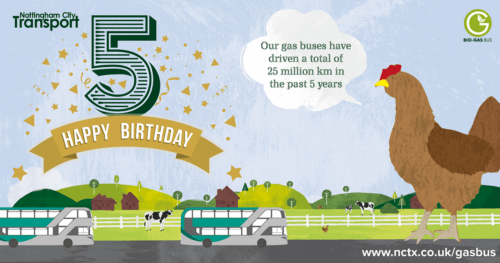It is five years since the first bio-gas double deck buses started running on the streets of Nottingham. The operator’s fleet of 120 gas buses – believed to be the largest fleet of bio-gas double-deckers in the world – have prevented over 26,000 tonnes of CO2 being emitted, as well as reducing NOx emissions by 180,000kgs.
Launched on 4 July 2017, bio-gas buses now run on three quarters of double-deck services in Nottingham and have clocked up over 15 million miles in service. Bio-gas is produced naturally through anaerobic digestion, using food waste, farm waste and sewage. The methane emitted from the digestion process is captured, treated and turned into fuel and the use of bio-gas has enabled NCT to halve its diesel consumption from eight million litres to four million litres per year.
Anthony Carver-Smith, NCT’s Head of Marketing, said: “Happy 5th birthday to our bio-gas buses, which have played a significant role in improving air quality in Nottingham. Following £42m investment in low emission vehicles since 2017, our fleet emissions have been reduced by 90%, demonstrating our commitment to reducing our environmental impact.”
Nottingham’s bio-gas buses were delivered in partnership with Nottingham City Council, Scania, Alexander Dennis and Roadgas, with part funding from the Government’s Office for Low Emission Vehicles. Twenty-three more bio-gas double deck buses have been ordered by Nottingham City Transport, which will operate on its Brown, Orange and Lime Line routes.


